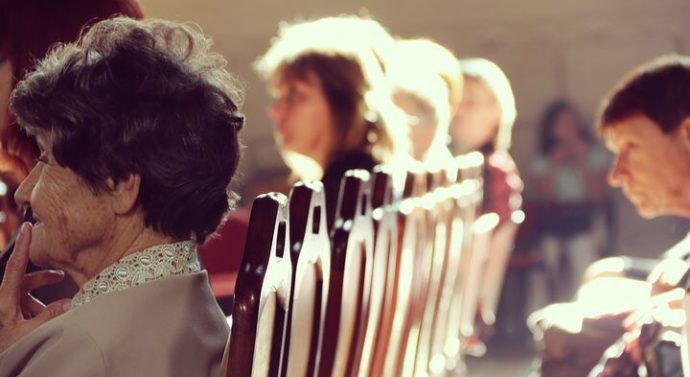
The history, traditions and meaning of Good Friday: Professors and students share their perspectives
Front Page, Lifestyle March 30, 2018, Comments Off 132Today, people across the world will celebrate the holiday of Good Friday. This holiday commemorates the arrest and trial of Jesus Christ, on charges of attempting to subvert the nation, opposing taxes, and most of all, making himself a King. The Mirror talked with professors and students about the history of Good Friday and the traditions they honor.
What is Good Friday?
“Good Friday is really about the reflection of the day that Jesus died on the cross,” said Dr. Peter Browning, who is a religion professor at Drury as well as the university’s chaplain.
“The understanding of that Friday being ‘good,’ comes from the Christian understanding of the sacrifice that Jesus made. The journey and experience is associated with a larger week, from Monday through Thursday, all of the way to the weekend and ending with Easter Sunday,” he explained.
The day ends with the crucifixion of Jesus. According to biblical sources, he was made to carry a crucifix to Calvary Hill and was crucified, dying later that day.
Good Friday is followed by Holy Saturday, which commemorates the day that Jesus’s body sat entombed. The final day of this week is Easter Sunday, which celebrates Jesus’s rebirth.
Good Friday across the world
Many countries around the world celebrate Good Friday as a federal holiday, including Canada, the United Kingdom, and Australia. Germany even has laws that prohibit acts like horse racing and dancing on the day.
While the U.S. doesn’t celebrate Good Friday as a federal holiday, several states, including Texas, New Jersey and Hawaii, honor Good Friday as a state holiday, meaning that most post offices, banks and courthouses will be closed to the public.
“If you look at the history of America going back to the period of the colonies, we decided that we would not have an established church,” said Browning. “The decision was made that we would be anti-establishmentarianism, where it wouldn’t just be assumed that if you were a member of the nation that you were a member of the church because churches are voluntary institutions.”
“If we mandate federal holidays like Good Friday so that all people observe them regardless of religion, that might seem to be beneficial, but it potentially would be a vulnerability because someday in the future Christianity may not be the dominate religion anymore,” reasoned Browning.
Religious traditions of Good Friday
Catholics and Eastern Orthodox followers aren’t the only ones who celebrate Easter and Good Friday. Some Lutheran and Anglican churches, as well as different branches of Protestants, practice the holiday, too.
“There are different traditions within Christianity,” said Browning. “Within the Orthodox and Catholic churches there are a lot of traditional feast days throughout the year that they partake in, but there are also various days of fasting that they honor as well.”
Catholics and Eastern Orthodox followers fast on the Friday and Saturday before Easter. Orthodox Christians honor the holiday by changing all the tapestries in the church to solid black and donning formal black vestments.
Catholics also practice a tradition known as “the stripping of the altar,” where the church altar is stripped bare on Good Friday, and the traditional ornaments such as the altar cloth, crosses and candlesticks are slowly replaced in time for Easter Mass.
“Some church traditions have emerged that are after the biblical account and are there to honor it, like the stripping of the altar,” said Browning. “What’s important to note is that people understand Good Friday in very different ways.”
Lutherans and Anglicans celebrate Easter with a vigil, usually on Saturday after the sun has set. During the vigil, a new paschal candle is lit, baptisms take place and the Easter Mass begins.
Protestants observe the holiday by loosely following Catholic traditions like holding baptisms and communion ceremonies. Some churches even offer a sunrise service with special hymns and songs.
The Easter Bunny, eggs and other nonreligious traditions

Photo via Pixabay.
With religion being the main focus of the holiday, how do the Easter Bunny and all those colored eggs come into play?
Eggs were not allowed to be eaten during Lent back in the Victorian era, so the eggs laid during that time would be saved and given to children to decorate. All over the world, the symbol of the egg represents joy, celebration, new life and resurrection.
The tradition of hiding eggs came about around the 19th century. Rabbits also symbolize new life; thus, the Easter Bunny was created. The mythical Easter Bunny’s job was to hide eggs the night before Easter Sunday for children to find. Not too long after, these real eggs were swapped with plastic ones filled with candies and other treats.
“I think American Christianity tends to focus very heavily on Easter,” said Browning. “While secular culture likes to talk about the Easter rabbit as a spring and new life understanding that is generally associated with the season.”
Student perspectives on the holiday
Many students on campus also celebrate the holiday. Drury sophomore and practicing Catholic, Hillary Talty, explains why Good Friday and Easter are important in her faith.
“Celebrating the passion and resurrection of the Christ is important to my faith because this is the central tenet of our faith. The whole of Christianity is based on the incarnation of Jesus: God becoming human, assuming our sins and dying in our place,” said Talty. “The resurrection assures us that we will rise to new life through Jesus and live in glory with him.”
In honor of the holiday, Talty and her family attend both Good Friday and Easter services at her church.
“We also color eggs to celebrate the new life that Christ gave us. Easter is a time of joy and celebration of the resurrection of Jesus Christ,” said Talty.
Another Catholic student on campus, Justin Revelle, explains why he enjoys celebrating Easter.
“I usually go and visit my family. I have two kid brothers, so we still do the whole Easter Bunny thing and it’s fun watching them run around,” said Revelle. “It’s good to see family on holidays and it reminds me that as long as kids still believe the Easter Bunny is hiding eggs, there might be some innocence left in the world.”
Article written by Claire Plaster and Ryan Smith.